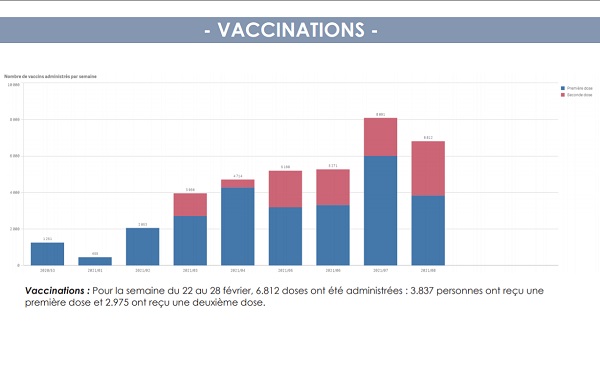 Blue: first dose of vaccine; pink: second dose;
Credit: MSAN
Blue: first dose of vaccine; pink: second dose;
Credit: MSAN
In its latest COVID-19 report, Luxembourg's Ministry of Health confirmed that the number of COVID-19 cases had gone up 5.1% last week compared to the week before.
For the week of 22 to 28 February 2021, the number of residents testing positive for COVID-19 increased from 1,249 to 1,313 people (up 5.1%) over one week. The number of identified contacts rose from 2,766 to 3,101 (up 13.5%). The number of PCR tests carried out over one week also increased, from 60,716 to 64,276.
As of Sunday 28 February 2021, the number of active infections stood at 2,822 (compared to 2,697 as of 21 February) and the number of people having recovered from the virus increased from 50,842 to 52,019. The number of weekly deaths stood at twelve (compared to sixteen the previous week), with the average age of those who died standing at 82.
There was a slight increase in hospital admissions, with 68 COVID-19 patients being treated in normal care and eighteen in intensive care, compared to 59 and fifteen respectively the previous week.
The two COVID-19 consultation centres (CCC), located in Luxembourg-Kirchberg and Esch-sur-Alzette, have recorded a total of 8,499 visits to date, including 401 visits last week (compared to 430 the previous week).
For the reference period, the effective reproduction rate (RT eff) decreased slightly from 1.04% to 0.95% and the positivity rate on all tests performed remained rather stable at 2.04% (compared to 2.06%) over one week (weekly average). The positivity rate on tests performed through a doctor's prescription (people with symptoms) decreased from 5.87% to 5.43%.
The incidence rate was 210 cases per 100,000 inhabitants (up from 200) over seven days. Compared to the previous week, the 0-14 (up 32%) and 15-29 (up 12%) age groups recorded the greatest increase, whilst the 30-44 (down 10%) age group recorded the greatest decrease. The 15-29 age group had the highest incidence rate while the 60-74 age group continued to have the lowest incidence rate. The average age of people diagnosed with COVID-19 dropped to 36.8 years.
For the week of 22 to 28 February, 2,649 people were in isolation (up 5% over one week) and 2,991 were in quarantine (up 9%).
The family circle remained the most frequent context of transmission of COVID-19 infections (48.4%), followed by the healthcare sector (4.9%), leisure (4.8%) and work (3.9%) environments. The source of infection was not clearly attributable in 33.1% of cases (down from 34.9%).
Vaccinations
For the week of 22 to 28 February, a total of 6,812 vaccine doses were administered in Luxembourg: 3,837 people received their first dose whilst 2,975 people received their second dose. At present, the Luxembourg authorities expect to have enough doses to vaccinate a total of 75,287 people by the end of March 2021. Allowances are likely to be adjusted from week to week according to the production capacities of manufacturers and deliveries.
COVID-19 variants
For the week of 15 to 21 February 2021, population sequencing coverage was 6.57%, which is less than the estimated coverage of 11% (the minimum requirement for a representative population sequencing sample). The authorities clarified that the frequency of variants declared during this period is thus not representative of the variants in circulation in Luxembourg.
That being said, the British variant (B.1.1.7) represented 52% of cases among the 82 non-representative samples carried out by the National Health Laboratory (Laboratoire National de Santé - LNS) for the week of 15 to 22 February. The South African variant (B.1.351) represented 22.7% of cases; no new cases of the Brazilian variant (P.1 or P.2) were found.
Wastewater monitoring
The latest CORONASTEP report drawn up by the Luxembourg Institute of Science and Technology (LIST) indicated a high prevalence of the virus in wastewater nationwide. As in the previous two weeks, an upward trend was observed for the week of 22 to 28 February 2021.








